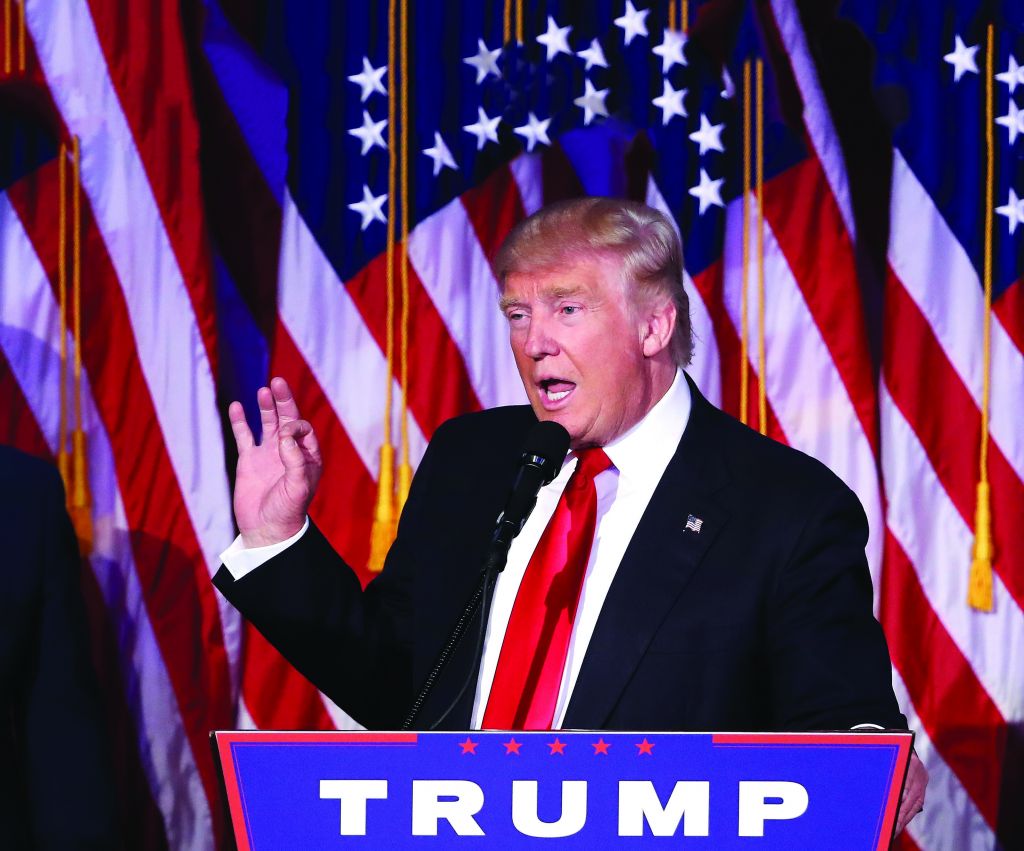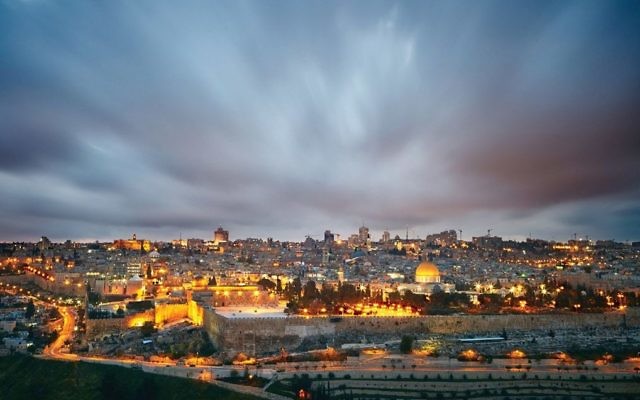Trump warned about ‘dangerous repercussions’ of moving embassy to Jerusalem
Israel's neighbours join European leaders in expressing concern while threatening a diplomatic backlash over the proposed move
Vociferous Arab and Muslim opposition is building to any possible US recognition of contested Jerusalem as Israel’s capital, as European leaders expressed concern about harm to fragile Middle East peace efforts.
Turkey threatened to cut ties with Israel, the Palestinians warned they would halt contacts with their US counterparts, and key Washington ally Saudi Arabia spoke out strongly against such a possible step.
Saudi Arabia, a regional powerhouse, is crucial to any White House plans to promote a possible Middle East peace deal.
President Donald Trump said he hopes to broker the “ultimate deal”, but has not divulged details.
French President Emmanuel Macron said he reminded Mr Trump in a phone call on Monday night that the fate of Jerusalem should be determined in negotiations on setting up a Palestinian state alongside Israel.
Mr Macron said in a statement that he expressed concern about any possible unilateral US moves and that he agreed with Mr Trump “to speak again shortly on this subject”.
EU foreign policy chief Federica Mogherini, who was meeting US secretary of state Rex Tillerson in Brussels, said any actions that undermine Middle East peace efforts “must be absolutely avoided”.
Jerusalem is home to the third holiest shrine of Islam, along with the holiest site in Judaism and major Christian holy sites.
It forms the combustible centre of the Israeli-Arab conflict.

Any perceived harm to Muslim claims to the city has triggered large-scale protests in the past, both in the Holy Land and across the region.
Mr Trump’s next move concerning Jerusalem remains shrouded in mystery.
US officials have said he may recognise Jerusalem as Israel’s capital this week as a way to offset his likely decision to delay his campaign promise of moving the US embassy there.
Mr Trump’s point-man on the Middle East, son-in-law Jared Kushner, later said the president has not decided yet what steps to take.
Meanwhile, the Trump administration appeared to have missed a statutory deadline to sign a new waiver keeping the US embassy in Israel in Tel Aviv.
The deadline came and went without any White House announcement about whether Mr Trump had signed a waiver.
Without the waiver, by law the embassy is supposed to move to Jerusalem.
At the same time, the prospect of Mr Trump recognising Jerusalem as Israel’s capital has triggered mounting opposition in the Arab and Muslim world.
East Jerusalem, now home to more than 300,000 Palestinians, was captured by Israel in 1967 and then annexed to its capital, a move most of the international community has not recognised.
Palestinians seek east Jerusalem as a future capital.
Israel’s current government, unlike its predecessors, rejects the idea of partition of the city.
Under international consensus and long-standing US policy, the fate of the city is to be determined in Israeli-Palestinian negotiations.
A Trump recognition of Jerusalem as Israel’s capital would upend Washington’s traditional approach to the conflict.
It was not immediately clear what Mr Trump could hope to gain from such a step, while downsides include alienating crucial Arab allies, from Saudi Arabia to Jordan.
On Tuesday, warnings against such a possible US move were pouring in from across the region.
Ahmed Aboul-Gheit, the head of the Arab League, urged the United States to reconsider.
A possible recognition of Jerusalem as Israel’s capital would be a “dangerous measure that would have repercussions” across the region, he said during a Cairo meeting of Arab League representatives gathered to discuss the issue.
Turkish President Recep Tayyip Erdogan told parliament that US recognition ofJerusalem as Israel’s capital was a “red line” and that his country’s response “could go as far as us cutting diplomatic ties with Israel”.
Israeli education minister Naftali Bennett played down the threat, saying that “at the end of the day it is better to have a united Jerusalem than Erdogan’s sympathy”.
In the West Bank, the diplomatic adviser of Palestinian President Mahmoud Abbas said recognition of Jerusalem as Israel’s capital could end Washington’s role as mediator between Israelis and Palestinians.
“If the Americans recognise Jerusalem as the capital of Israel, then this would mean they decided, on their own, to distance themselves from efforts to make peace and that they will have no credibility or role in this issue,” Majdi Khaldi said.
“We will stop our contacts with them (in the event of recognition) because such a step goes against our existence and against the fate of our cause,” Mr Khaldi said.
“It targets Muslims and Christians alike.”
Palestinian political factions led by Mr Abbas’s Fatah movement called for daily protest marches this week, starting on Wednesday.
Saudi Arabia expressed its “grave and deep concern” about possible recognition.
In a statement on the state-run Saudi Press Agency, the foreign ministry said that the kingdom affirms the rights of Palestinian people regarding Jerusalem, which it said “cannot be changed”.
The statement warned that this step would “provoke sentiments of Muslims throughout world”.
On Monday, the Organisation for Islamic Co-operation, which has 57 member states, said US recognition of Jerusalem as Israel’s capital would constitute “naked aggression” against the Muslim and Arab world.

Thank you for helping to make Jewish News the leading source of news and opinion for the UK Jewish community. Today we're asking for your invaluable help to continue putting our community first in everything we do.
For as little as £5 a month you can help sustain the vital work we do in celebrating and standing up for Jewish life in Britain.
Jewish News holds our community together and keeps us connected. Like a synagogue, it’s where people turn to feel part of something bigger. It also proudly shows the rest of Britain the vibrancy and rich culture of modern Jewish life.
You can make a quick and easy one-off or monthly contribution of £5, £10, £20 or any other sum you’re comfortable with.
100% of your donation will help us continue celebrating our community, in all its dynamic diversity...
Engaging
Being a community platform means so much more than producing a newspaper and website. One of our proudest roles is media partnering with our invaluable charities to amplify the outstanding work they do to help us all.
Celebrating
There’s no shortage of oys in the world but Jewish News takes every opportunity to celebrate the joys too, through projects like Night of Heroes, 40 Under 40 and other compelling countdowns that make the community kvell with pride.
Pioneering
In the first collaboration between media outlets from different faiths, Jewish News worked with British Muslim TV and Church Times to produce a list of young activists leading the way on interfaith understanding.
Campaigning
Royal Mail issued a stamp honouring Holocaust hero Sir Nicholas Winton after a Jewish News campaign attracted more than 100,000 backers. Jewish Newsalso produces special editions of the paper highlighting pressing issues including mental health and Holocaust remembrance.
Easy access
In an age when news is readily accessible, Jewish News provides high-quality content free online and offline, removing any financial barriers to connecting people.
Voice of our community to wider society
The Jewish News team regularly appears on TV, radio and on the pages of the national press to comment on stories about the Jewish community. Easy access to the paper on the streets of London also means Jewish News provides an invaluable window into the community for the country at large.
We hope you agree all this is worth preserving.






















